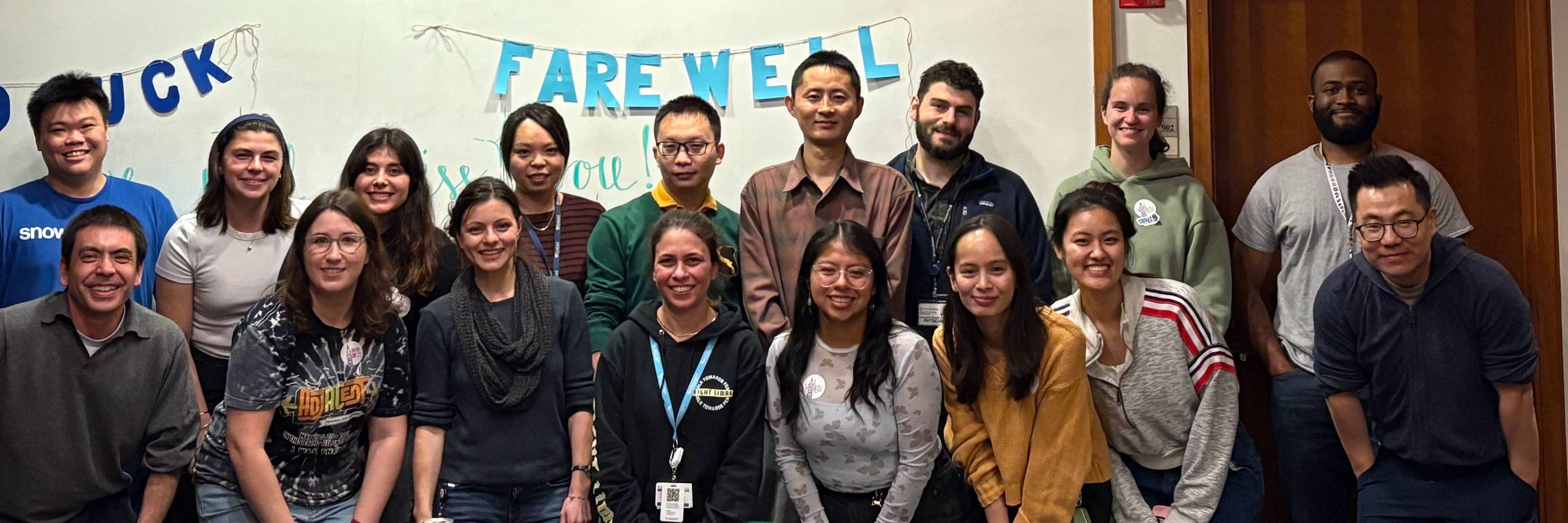
Cadwell Lab
@cadwelllab.bsky.social
We investigate the interface between the immune system and diverse infectious agents ranging from friendly gut microbes and viruses to disease-causing parasites
Our Lab: https://www.med.upenn.edu/cadwell-lab/
Our Lab: https://www.med.upenn.edu/cadwell-lab/
Overall, we discovered that an intervention as simple as changing cages can control duration of viral infection in mice. Huge shoutout 🙏 to Christin and coauthors, the Gnotobiotics core at both Penn and NYU, and PennCHOP microbiome program for making this study possible 5/5
June 27, 2025 at 12:29 AM
Overall, we discovered that an intervention as simple as changing cages can control duration of viral infection in mice. Huge shoutout 🙏 to Christin and coauthors, the Gnotobiotics core at both Penn and NYU, and PennCHOP microbiome program for making this study possible 5/5
Cage change is a stress-inducing event for 🐭! We found that the fluctuation of glucocorticoids (hormones released under stress) contributes to viral clearance, and interference with this hormonal stress response actually inhibits MuAstV clearance after cage change! 4/5
June 27, 2025 at 12:28 AM
Cage change is a stress-inducing event for 🐭! We found that the fluctuation of glucocorticoids (hormones released under stress) contributes to viral clearance, and interference with this hormonal stress response actually inhibits MuAstV clearance after cage change! 4/5
Although continuous exposure to the viral reservoir does contribute to this persistent infection, we found that there is more at play here 🤔 In fact, cage change induces the activation of CD8 T cells and an interferon response in intestinal epithelial cells, driving the clearance of MuAstV. 3/5
June 27, 2025 at 12:26 AM
Although continuous exposure to the viral reservoir does contribute to this persistent infection, we found that there is more at play here 🤔 In fact, cage change induces the activation of CD8 T cells and an interferon response in intestinal epithelial cells, driving the clearance of MuAstV. 3/5
We found in this study that Murine Astrovirus (MuAstV), an enteric RNA virus that is prevalent in wild, lab, and pet store mice, persists indefinitely in mice when they remain unperturbed in their cage. However, MuAstV is rapidly cleared after we change a mouse’s cage 🤯 2/5
June 27, 2025 at 12:25 AM
We found in this study that Murine Astrovirus (MuAstV), an enteric RNA virus that is prevalent in wild, lab, and pet store mice, persists indefinitely in mice when they remain unperturbed in their cage. However, MuAstV is rapidly cleared after we change a mouse’s cage 🤯 2/5
Congratulations @christinviral.bsky.social !!! Amazing job starting from an intriguing observation and drilling down to an exciting immune mechanism!
June 26, 2025 at 12:16 PM
Congratulations @christinviral.bsky.social !!! Amazing job starting from an intriguing observation and drilling down to an exciting immune mechanism!
Once again, thank you NIH for making this possible and our amazing coauthors. Special shoutout to coauthors Patty Martin and @torreslab.bsky.social for launching this project 🚀 5/n
May 17, 2025 at 10:25 PM
Once again, thank you NIH for making this possible and our amazing coauthors. Special shoutout to coauthors Patty Martin and @torreslab.bsky.social for launching this project 🚀 5/n
Maybe ATG16L1 T300A is under balancing selection, like hemoglobin and APOL1 variants that are protective if you have 1 copy but 2 copies are bad (sickle cell/kidney disease)🤷♀️? Lots of questions surrounding mechanism that we’re continuing to examine 4/n
May 17, 2025 at 10:25 PM
Maybe ATG16L1 T300A is under balancing selection, like hemoglobin and APOL1 variants that are protective if you have 1 copy but 2 copies are bad (sickle cell/kidney disease)🤷♀️? Lots of questions surrounding mechanism that we’re continuing to examine 4/n
Turns out mice heterozygous for the variant, but not homozygotes, are highly protected from Salmonella and Listeria due to enhanced inflammasome🔥 activity! Macrophages from T300A heterozygous humans displayed similar enhanced inflammasome 🔥 3/n
May 17, 2025 at 10:25 PM
Turns out mice heterozygous for the variant, but not homozygotes, are highly protected from Salmonella and Listeria due to enhanced inflammasome🔥 activity! Macrophages from T300A heterozygous humans displayed similar enhanced inflammasome 🔥 3/n
Most people have at least 1 copy of the ATG16L1 T300A variant even though it’s associated with increased susceptibility to Crohn’s disease. What gives? 2/n

a rabbit from the secret life of pets is making a funny face and saying heh .
ALT: a rabbit from the secret life of pets is making a funny face and saying heh .
media.tenor.com
May 17, 2025 at 10:25 PM
Most people have at least 1 copy of the ATG16L1 T300A variant even though it’s associated with increased susceptibility to Crohn’s disease. What gives? 2/n
Fantastic. Congrats!!!
April 30, 2025 at 1:01 AM
Fantastic. Congrats!!!
Beautiful work @edelblumlab.bsky.social !
March 22, 2025 at 2:58 PM
Beautiful work @edelblumlab.bsky.social !
Reposted by Cadwell Lab
There's more exciting work to come from the rewilding experiments, so please do stay tuned for work from @grahammunology.bsky.social @cadwelllab.bsky.social et al.
March 16, 2025 at 8:37 PM
There's more exciting work to come from the rewilding experiments, so please do stay tuned for work from @grahammunology.bsky.social @cadwelllab.bsky.social et al.

